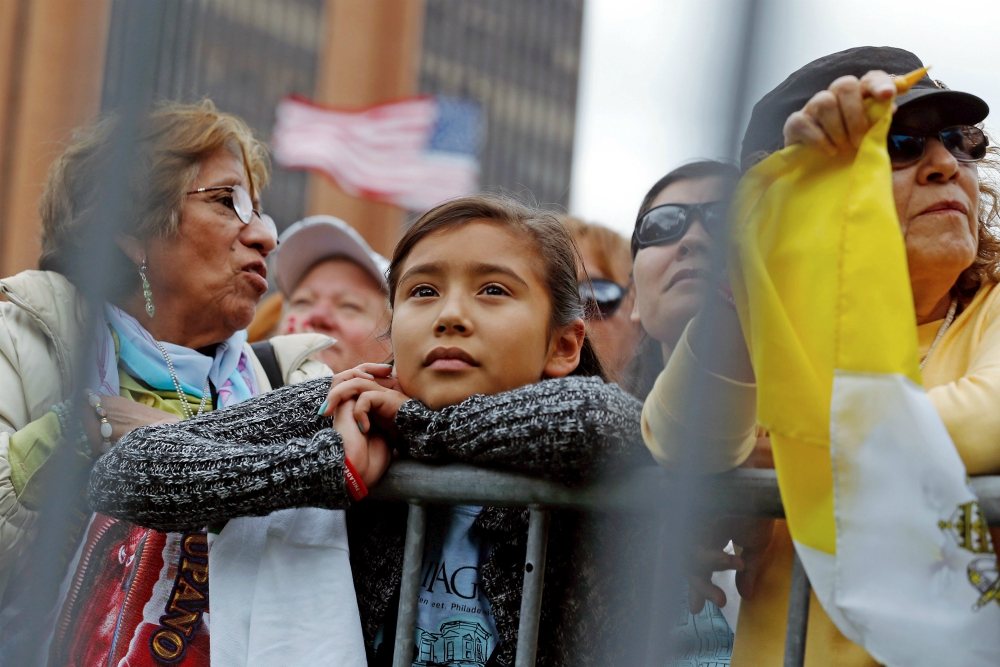
People waiting outside to hear Pope Francis speak at Independence Hall watch on large screens as he celebrates Mass at the nearby cathedral basilica in Philadelphia Sept. 26, 2015. (CNS/Reuters/Jonathan Ernst)
The Latino Catholic community in the United States has long been a "sleeping giant," but "a great awakening" is taking place, according to an international expert who has been tinkling bells in the giant's ears for a half century.
"We've seen it looming for the past 50 years," emphasized Jesuit Fr. Allan Figueroa Deck. "It is a significant sea change ... and the vitality of the church is what's at stake. Demographically, as you know, Latinos are the youngest group of American Catholics today, and the youth is the future."
Deck, distinguished scholar of theology and Latino studies at Los Angeles' Loyola Marymount University, said he agrees "with Harvard sociologist Robert Putnam that Latinos are the leading indicators of the church's future. So if the bishops or anyone else is interested in the church's future, you have to pay attention to the Latinos. It's not rocket science."
"Manifestations" of the emerging, incremental self-awareness and influence of Hispanic Catholics "have not been dramatic," but nonetheless exhibit broad implications for such matters as social justice work, liturgical celebration, parish life and seminary formation, the well-known theologian told NCR.
Latinos are poised "to be strong bridge-builders," he observed. "They have a foot in different worlds."
Pope Francis' role in the process of ending "the long hibernation" has been key, Deck underscored during a Jan. 25 interview with NCR, two days before he delivered a keynote address at the Los Angeles Archdiocese's V Encuentro assembly of nearly 1,200 local Hispanic leaders.
Calling Francis "the right man at the right time," Deck praised the pope's leadership and said it resonates deeply with Latinos.
"Certainly, the appearance of Pope Francis has been a big shot in the arm for many of us," he said, and represents a human "bridge to the Third World, a bridge to a global church."
Deck praised the simplicity of Francis' style on display since the Argentina-born Cardinal Jorge Mario Bergoglio stepped onto the balcony of St. Peter's Square after his election five years ago.
"All of Francis' gestures — bowing, wearing his old pectoral cross, not the fancy one — all of these are very simple, but they speak more loudly than papal encyclicals. And that's exactly what we needed," Deck said.
The pope "realized that the best way to communicate is not so much conceptually but by gesture, by ritual, by symbol — and that is how he is able to communicate," Deck added. "And I think that is why he is being effective."
A core element of Latin American Catholicism, Deck said, is "to begin with the person in front of you, the person, the human, not the conceptual," and this underpins much of the Jesuit pope's teaching.
"And so what we see is a wonderful coming together of the particular contribution that Latin American Catholicism can make to the church with the ministry of Pope Francis, who is a product of this experience," he explained.
"There is no going back to a Eurocentric, Westernized church," he said.
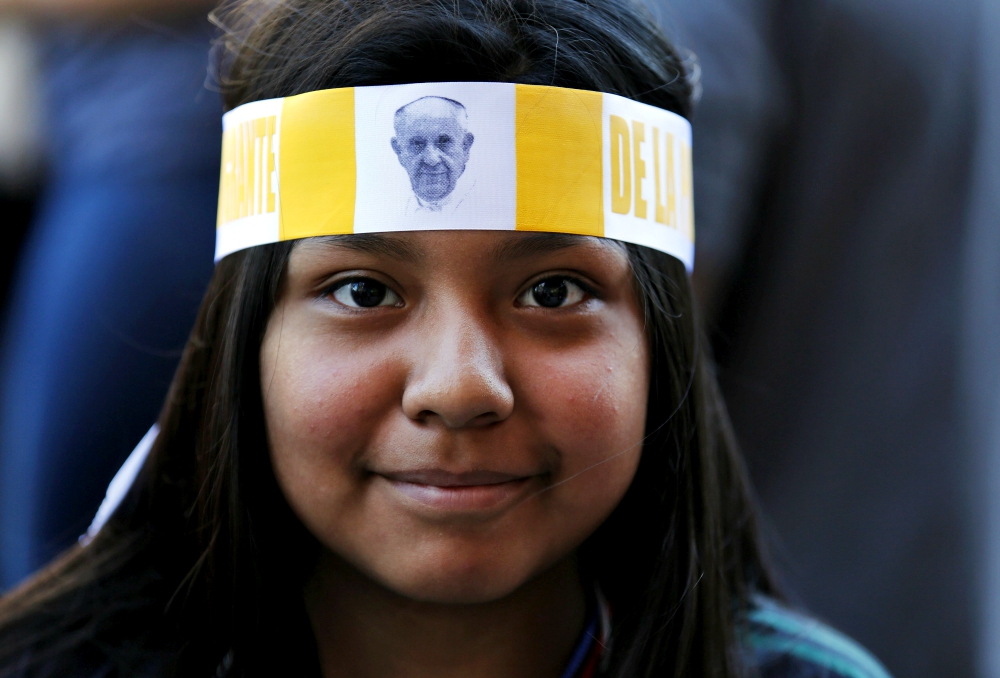
Tracy Pineda from Mexico wears a headband featuring Pope Francis after she greeted him outside the Cathedral of St. Matthew the Apostle Sept. 23, 2015, in Washington. (CNS/Reuters/Yuri Gripas)
"There is a synergy with this and something that is very Jesuit — namely, paying attention to people, places and circumstances — which really is embodied in the documents of the Society of Jesus, the Jesuit order," said Deck.
"That has become even more clear to me lately with Pope Francis' emphasis on the need for discernment in the church. Discernment is about paying attention to people, places and circumstances," he repeated, "and not just 'going by the book,' or paying attention to the formulations and formula."
Deck emphasized the importance of "inductive" doctrinal methodology over deductive, "a contextual theological method, a pastoral one that is captured in the phrase 'See. Judge. Act.' Very simple."
Instead of proceeding deductively "from doctrine, from rules, from regulations, from customs," the church should "pick up with what Vatican II really proposed — that we must be inductive and proceed with the reality that is in front of us, and that the focus must be on the present and future more than it should be the past," Deck explained. "Not that the past is not important, not that tradition is not important, but our understanding of tradition is that it must always be brought forward and engage the people and the circumstances in front of us."
He cautioned the "European church and the Anglo-American church not to get bogged down with standards and rules," something that "not only the conservatives can get hung up on, by the way, but the liberals, too."
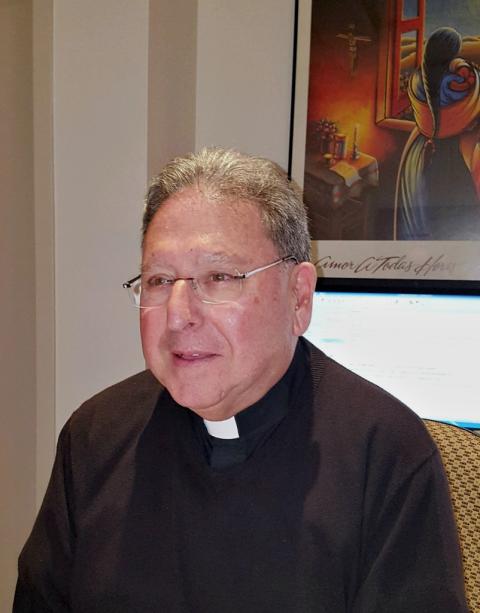
Jesuit Fr. Allan Figueroa Deck (NCR photo/Dan Morris-Young)
Between Latin American Catholics and Francis, there is a broad resonance, a "connaturality," on this understanding, he said.
Hispanic Catholics also share the pope's clear distaste for clericalism, Deck said.
"Watch out for any and every kind of clericalism because it's the biggest bane to the church's evangelizing mission," he said. "It does a lot of damage."
Pointing out that Francis "mentions this often, wherever he goes," Deck said that clericalism "cuts people off from assuming the responsibility they have for their faith and for their church. It doesn't allow them to exercise their proper roles in the mission of the church, and it deprives the church of talent and ideas and possibilities."
"Priests perhaps don't like to talk about it," he said. "It's a delicate subject. But it's very real and it needs to be constantly brought to our attention."
In that regard, Deck said, "in popular Catholicism in Latin America," there has been a long-standing "resistance to impositions of various sorts."
"And while it's not in opposition to standard or authoritative Catholicism, it is somewhat in tension with it, in tension with the Catholicism of the priests and bishops ... but not in opposition to it," he said.
That is especially true for "Mexican Catholicism," he added. "It is very distinctive. And it is very strong. It is where evangelicals have had less success. They have learned how to live with a certain kind of clerical Catholicism, a certain kind of ecclesiastical culture, but also how to gently resist it."
Does that fly in the face of the meme that Hispanic Catholics defer to the clergy?
"Yes, it does," said Deck. "So, it's both-and. It's not false to say there is a kind of deference, but it is not an either-or thing. Community knows how to resist when it needs to, in the long term."
At the same time, he said, "they are very loyal to the church."
Ironically, points out Deck and social scientists, Hispanic Catholics are also increasingly disaffiliating with the church.
A 2014 Pew study reported that nearly one in four Latinos in the U.S. is a former Catholic. The study also said the percentage of Hispanics who identify as Catholic dropped from 67 percent in 2010 to 55 percent in 2013.
"For years, people were concerned about Latinos' flight toward evangelicalism, to Pentecostalism, but actually I would say the movement now is greater in the direction of disaffiliation," Deck said. "Not that they cease to believe in God, but they feel liberated from what they perceive to be an oppressive Catholicism."
The trend is particularly sharp among younger Hispanics, he observed, who often perceive the church as "exclusive of people, and that it discriminates against certain people," notably the LGBT community. "This is very scandalous to a lot of young people," he said.
"There continues to be a failure to acknowledge the role of women in the church that for our younger Latinos, certainly, is a matter of concern and something that turns them off. When they perceive this, it discourages them.
"So, we have to continue to confront, as Francis has proposed, the issue of the participation of women in the church, in leadership and different functions in the church," Deck added.
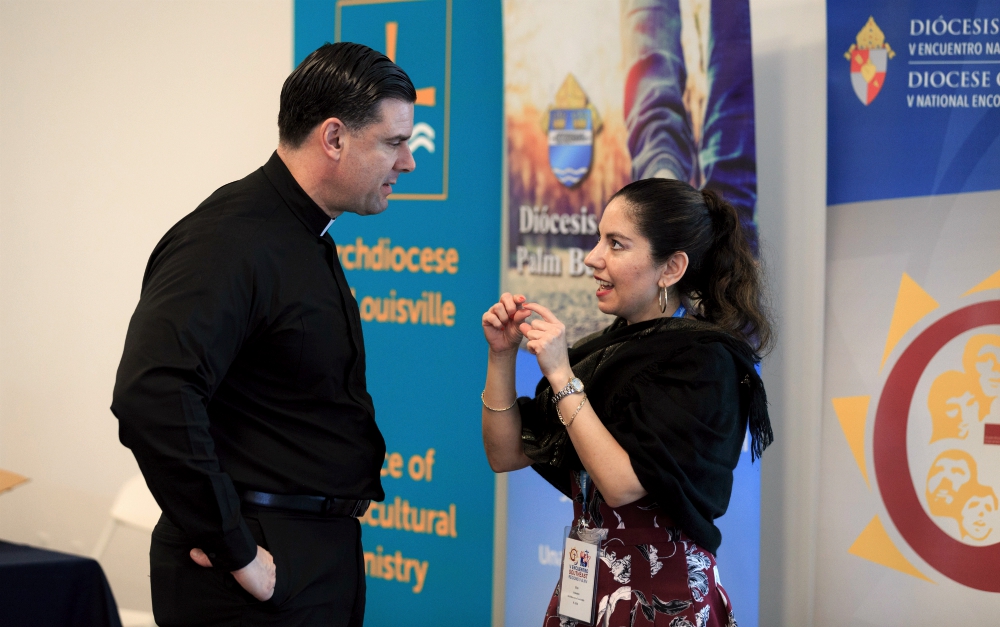
Piarist Fr. Rafael Capo, director of the Miami-based Southeastern Pastoral Institute, talks with Eva Gonzalez, Hispanic ministry director from the Archdiocese of Louisville, Kentucky, Feb. 23 during the Southeast Regional Encuentro. Held in Miami Feb. 22-24 at Our Lady of Guadalupe parish complex, it drew 340 leaders from among some 30 dioceses in the Southeastern U.S. (CNS/Tom Tracy)
As with the wider church, he pointed out, not all Latinos are on the same page on LGBT issues, marriage and divorce, celibacy, and other debated topics.
"We need to be honest about what is the appropriate way to reach out" to the LGBT community. "That's a source of tension because Latino cultures are in some ways quite traditional about these matters. On the other hand, there is a pastoral imperative, I think, to be sensitive to people."
Similarly, he said, "the teaching of Pope Francis challenges us to get away from the bad effects of machismo. That kind of thing."
"By and large," he said, "people are very supportive of the direction that Francis is taking the church, and so this can be an opportunity for cultural conversion, cultural development."
Has Francis' openness moderated younger Hispanic Catholics' concerns?
"Certainly, Francis has mitigated it, and is trying to," Deck replied. "But the church is undergoing with Francis a very interesting period of reform, and not everybody is on board or comfortable with this."
"It is going to take us a very long time to get to what I consider to be the long-term agenda of the Second Vatican Council — which is what he is trying to put into motion, what he has been encouraging," Deck said.
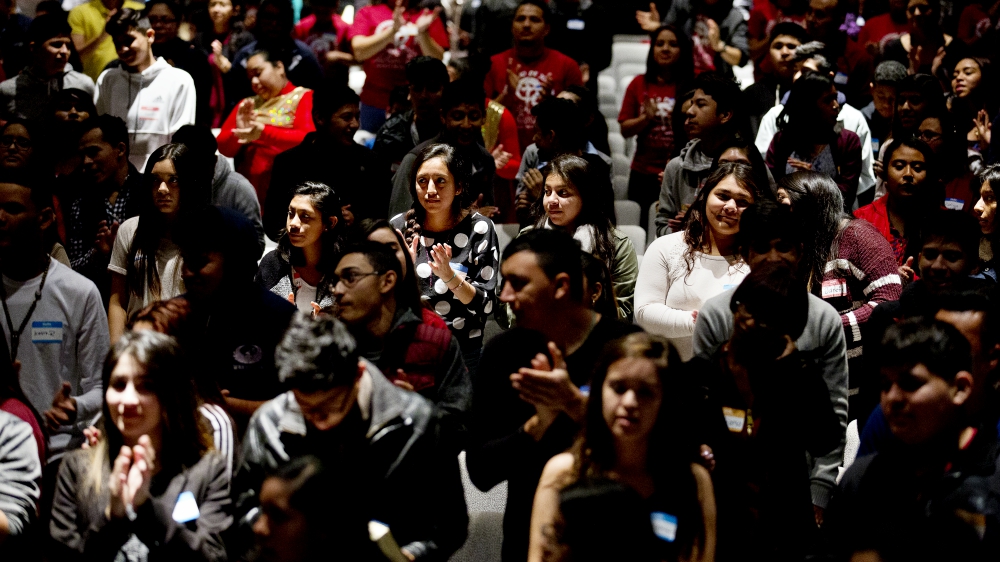
Young people are seen during a daylong regional encuentro Oct. 28, 2017, at Herndon Middle School in Herndon, Virginia. About 600 Hispanic/Latino young adults attended the gathering, which was part of the U.S. Catholic Church's preparations for V Encuentro in 2018. (CNS/Tyler Orsburn)
Still, "as new generations arise who are turning away from the church," he added, at the same time "Hispanics are the main group who fill our Masses, fill our churches, in a period when many churches are being emptied."
And they do so with energy, he said. "There is a kind of vitality that the Latinos bring to the life of the church. All over the country, the worship, the eucharistic liturgy, the Masses attended by Hispanics tend" to exhibit "great participation and vitality."
The 2014 Pew survey noted that if trends in immigration and shifting religious affiliation continue, "a day could come when a majority of Catholics in the United States will be Hispanic, even though the majority of Hispanics might no longer be Catholic."
Deck predicted the Hispanic/Latino influence on parish worship will grow, and is already evident in many places with "more flexibility in liturgical life" often reflecting "respect for the religious customs of the people."
"We see an awareness of the need to base liturgical reform not simply on the authoritative texts but on the real practice of the people, popular devotions of the people," he said.
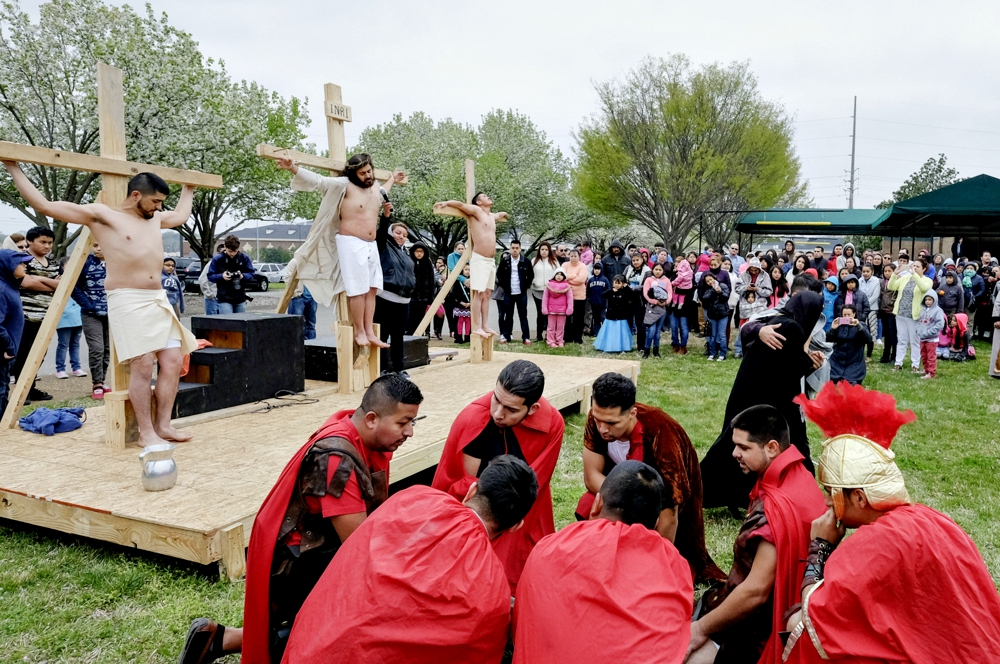
Hispanic Ministry members at Sagrado Corazon in Nashville, Tennessee, portray the Stations of the Cross March 25, 2016. (CNS/Tennessee Register/Rick Musacchio)
"Reform of the liturgy and regard for popular piety are not antithetical," he said. "This is important."
Deck said seminary formation programs are aware of the need to help non-Hispanic seminarians understand and embrace Latino worship ethos and cultures.
Likewise, he said, it is encouraging that some seminaries have long made Spanish language study mandatory.
However, he expressed concern about traits exhibited by a segment of seminarians and young priests.
"I don't think it is any secret that there is a major concern in our country for what we perceive to be the attraction of young men to the priesthood who seem to be rigid and at times lacking affective maturity and the ability to grow in discernment."
"This is antithetical" to ordained ministry, he said. "If this is a valid trend, if this is true, then we have a trend that works directly against the church's mission to evangelize. We will have a clergy that is not suitable for it if that trend is not corrected."
The reasons for this trend "are very complicated," Deck added, "but it is a source of grave concern to many people."
Advertisement
As an example, he said there are reports "that some seminarians have said they don't need to learn Spanish because they are learning Latin."
"My response would be that we are talking about two different things. One has intimately to do with a broad pastoral perspective of the church and a pastoral responsibility. Saying Mass in the extraordinary rite is not a bad thing, but its pastoral significance is miniscule compared to the significance of being able to reach out in Spanish."
Deck hit hard on the word "miniscule."
He advises prelates, pastors, parish leaders, seminarians and others to get to know the reality of Hispanic Catholics' lives and listen to them to build bridges and community.
This includes, he detailed, becoming aware of the diversity within the Hispanic/Latino community, which is often portrayed as homogeneous. There are more than two dozen Central and South American nations with varied cultures, mores, language usages, social perspectives — all of which are represented in the Hispanic/Latino residents of the U.S., he pointed out.
Deck said Catholic Latinos should "take more responsibility and initiative and to be bolder, to acknowledge the role they have as the principle evangelizers" of society "before even the bishops and priests."
"Inexorably, we are reaching a moment in our church history in the United States where we will move to a significant inclusion of Latino" influence on church governance and direction, he summarized.
Yet even before the sheer numbers of Latino Catholics reached today's level and before Francis' election, the "Latin church significantly influenced the Catholic Church in the United States," Deck noted.
The sources and "conduits for those trends," he pointed out, include the groundbreaking 1968 post-Vatican II gathering of the Latin American Episcopal Council (known as CELAM) in Medellín, Colombia. That gathering threw support behind base Christian communities and the tenets of liberation theology.
In addition, he said, "significant numbers of American priests, religious and laypeople — whether Latino or not — were impacted by missionary work in Latin America and by various contacts there," experiences and ways of thinking they brought back to North America.
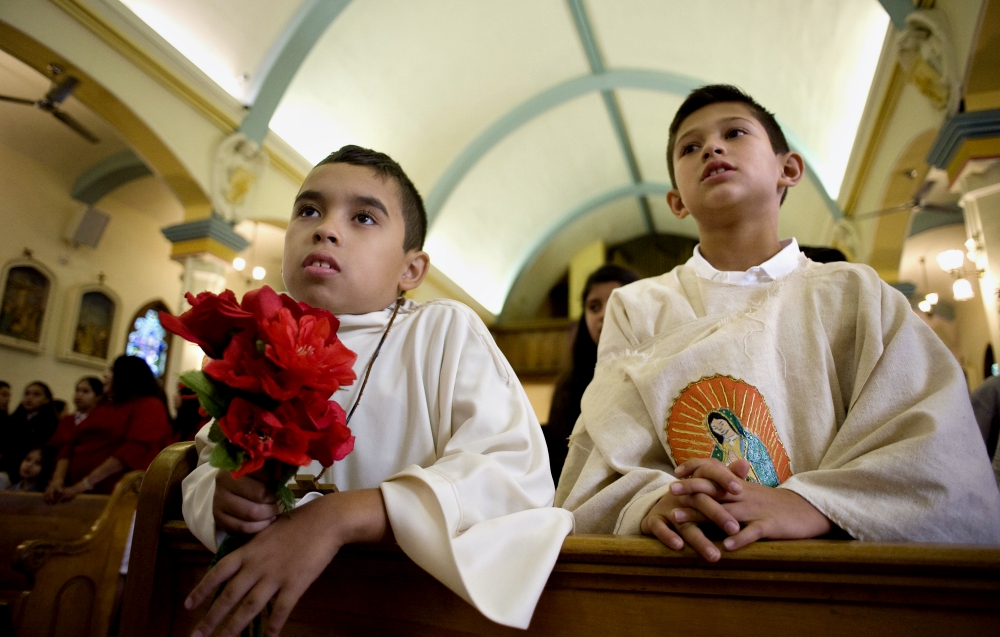
Johann Palomino, 11, and Archie Gonzalez, 10, attend a Mass celebrated in honor of the 100th anniversary of Our Lady of Guadalupe Church in San Diego Dec. 9, 2017. (CNS/David Maung)
That "lens of the Latino culture and of Latin American Catholicism," he said, "is the lens I have brought to my work as a theologian and in my work in spirituality and culture."
"I am kind of an entrepreneurial person who likes to engage the life of the church and society from the angle of my Hispanic heritage for the purpose of bringing people together, to move forward, to progress, to progress toward what needs to happen, for there to be greater harmony, greater participation, greater communion among people," he said.
"I always wanted to be part of the historic rise of Latinos in the church and in society in the U.S., and I have had a chance to do that as a Jesuit," said Deck, who joined the Society of Jesus when he was 18 after graduating from Los Angeles' Loyola High School in 1963. Today he is rector of the Loyola Marymount Jesuit community.
Latino/Hispanic ministry appears to have been his birthright.
Deck's grandmother was widowed during the Mexican Revolution (1910-20) and fled to the U.S. from Sonora, Mexico, with his mother (Amparo Figueroa) and three other children.
His father "was the son of a second-generation son of German immigrants and of a first-generation Tex-Mex mother. So I am Mexican on both sides," Deck said. Both parents were bilingual.
The Jesuit's official Hispanic ministry started at the grassroots level as administrator of Our Lady of Guadalupe in the Delhi barrio of Santa Ana, California, and as the first director of the Orange Diocese's Hispanic Ministry.
"My approach," he said, "has been praxiological, moving from research, writing and teaching in various venues — academic and popular — and in direct engagement through the establishment of institutions that address pastoral needs."
"Establishment of institutions" might be an understatement. A prolific author and popular speaker, Deck:
- In 1988, founded the Instituto Hispano of the Jesuit School of Theology at Santa Clara University, and was its first executive director;
- In the same year, co-founded the Academy of Catholic Hispanic Theologians of the United States and served as its first president;
- Helped launch the National Catholic Council for Hispanic Ministry in the early 1990s;
- Founded in 1997 and worked as first executive director of the Loyola Institute for Spirituality in Orange, California;
- Oversaw development of the U.S. Conference of Catholic Bishops' Secretariat of Cultural Diversity in the Church and served as the first executive director from 2008 to 2012;
- Has been working with the Association of Catholic Colleges and Universities to develop intercultural literacy training workshops similar to the "Building Intercultural Competence for Ministers" series offered by the U.S. bishops' diversity secretariat;
- Has made time to serve on boards of directors for the Jesuit School of Theology at Santa Clara University, for the Center for Applied Research in the Apostolate at Georgetown University, for Homeboy Industries, and for Verbum Dei High School in Los Angeles.
Along the way, the Jesuit has also held full-time teaching assignments at Loyola Marymount and the Jesuit School of Theology, as well as edited or authored several books, including a 2016 papal biography, Francis, Bishop of Rome: The Gospel for the Third Millennium.
[Dan Morris-Young is NCR's West Coast correspondent. His email is dmyoung@ncronline.org.]
We can send you an email alert every time The Field Hospital is posted. Go to this page and follow directions: Email alert sign-up.







